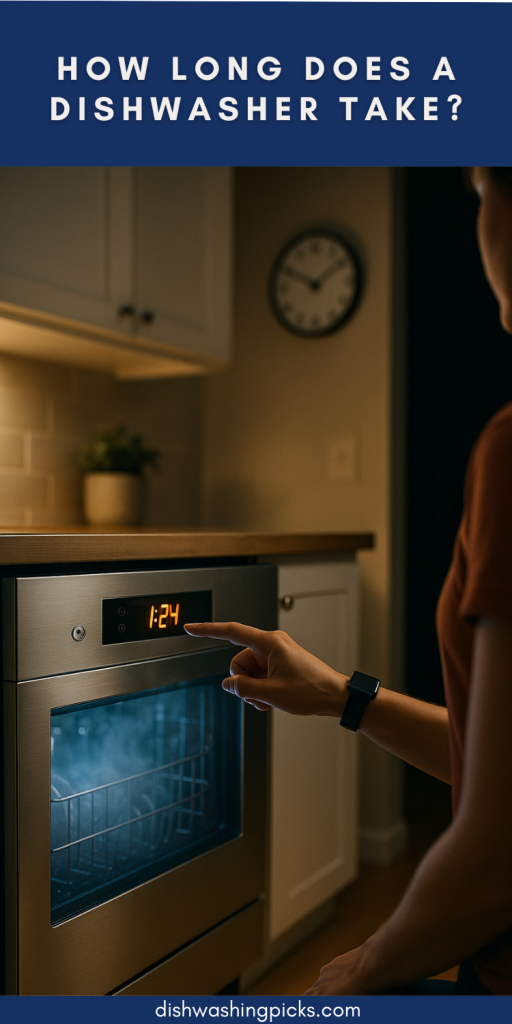
Spoiler: It’s not just “press and done” — but let’s make sense of it all.
Ever found yourself standing in front of your dishwasher, glancing at the little digital timer and thinking, “Why does this thing take so long?!” You’re not alone. It’s a common question, and the answer isn’t as straightforward as you might think.
Imagine this: You just finished dinner. Dishes loaded, detergent pod in place, button pressed… and then you see it — 2:47 on the screen. Wait, what? Two hours and forty-seven minutes to clean some plates?!
Let’s break it down, shall we?
1. What’s the Average Cycle Time?
Here’s the ballpark:
🕒 Most standard dishwasher cycles take anywhere from 1.5 to 4 hours.
Yep, that’s quite a range — and it depends on a few sneaky factors:
- The model and brand of your dishwasher
- The selected wash cycle (Eco, Normal, Heavy, etc.)
- The soil level on your dishes
- Whether you’re using heated drying
The average “Normal” cycle typically lands somewhere around 2 to 2.5 hours.
Tip: Newer, energy-efficient dishwashers tend to run longer because they use less water and lower temperatures, which means they need more time to get things sparkling clean.
2. Quick Wash vs Heavy Duty – What’s the Difference?
It’s tempting to hit “Quick Wash” every time — especially when you’re in a hurry. But let’s decode the main cycles and what they’re actually good for:
- Quick Wash:
⏱ ~30 to 60 minutes
Great for lightly soiled dishes or when you need clean plates fast. Not ideal for pots or baked-on gunk. - Normal Cycle:
⏱ ~2 to 2.5 hours
The go-to for everyday loads. Balances cleaning power with energy efficiency. - Heavy Duty / Pots & Pans:
⏱ ~2.5 to 4 hours
Designed for greasy pans and stubborn grime. Long and hot — but thorough. - Eco Mode:
⏱ ~2 to 3.5 hours
Lower energy and water use, but takes longer. Go green and be patient.
Try thinking of it this way: The longer cycles don’t mean the dishwasher is being lazy — they’re just pacing themselves to be efficient without guzzling energy.
3. What About Drying Time?
Drying can actually tack on 20–30 extra minutes, depending on the cycle. If you choose:
- Heated Dry: Dishes get baked at the end (uses more energy).
- Air Dry / No Heat: Longer time, lower energy cost, and a bit more waiting. But hey — less electricity!
If you’re in a rush, just pop open the door after the final rinse and let everything air dry naturally. It speeds things up and helps prevent those annoying water spots too.
4. Why Does My Dishwasher Take So Long Sometimes?
Here are a few possible reasons:
- Sensor cycles — Smart dishwashers detect how dirty the water is and adjust time accordingly.
- Low water pressure — Slows down fill times.
- Cold water supply — If your water heater is sluggish, the cycle may extend while the dishwasher waits for hot water.
- Hard water buildup — Can affect cleaning and rinse times.
Want a quicker wash? Run your kitchen faucet until the water gets hot before starting your dishwasher — it helps jumpstart the cycle.
5. So, What’s the Best Time to Run It?
If time’s not of the essence, try running your dishwasher:
- Overnight — especially if your model is quiet.
- During off-peak hours — some utility companies offer lower rates at night.
Plus, it’s pretty satisfying to wake up to clean dishes.
Conclusion: Don’t Watch the Clock—Trust the Process
Yes, a dishwasher might take longer than scrubbing by hand — but it’s doing all the work for you. And it’s usually using less water, less energy, and giving you more free time in return.
So next time you see that 3-hour timer, just smile, hit start, and go do something you enjoy. The dishwasher’s got this.
